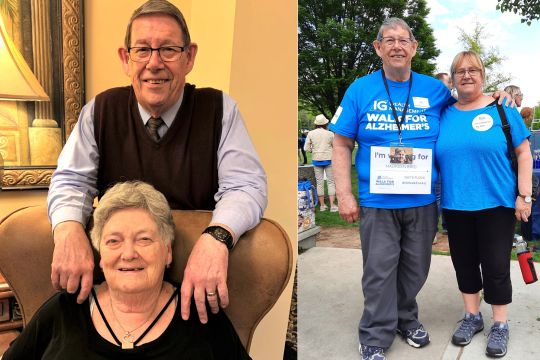
Federal Retirees member and volunteer Guy Bird is pictured with his wife Maureen and at the 2022 Walk for Alzheimer's with his daughter, Donna Lessard (far left).
Guy Bird cared for his wife, Maureen, for 12 years — from her diagnosis with Alzheimer’s until six months before her death. He shares his insights.
Guy Bird remembers the first time he decided he needed help to care for his wife, who’d been suffering from Alzheimer’s disease for 12 years.
“The very morning she was supposed to go in to the care home, I called and asked if they’d be mad if I changed my mind,” Bird recalls. “They said ‘No,’ so I kept her home for another two years. She was still sufficiently cognitive that she thanked me for doing that, but the second time, when she did go to a care home for the last six months [of her life], she was way beyond that.”
When his wife was first diagnosed, a doctor told them her response times had already slowed down, and she shouldn’t drive. That was the beginning of Bird’s long journey. But even today, he says in some ways, he was lucky as a caregiver.
“I didn't have to hide the car keys. I didn’t have to unplug the electric stove,” he says. “I didn't have to lock the doors at night with a deadbolt or get up in the middle of a winter night to bring her back into the house in her pyjamas. And I didn't have to duck to avoid flying objects.”
As the facilitator of a support group for caregivers, Bird knows all too well that all of those things could have been his fate. But that doesn’t mean it was ever easy.
He did have to get rid of the “bad cat” — they only had one, but he successfully rebranded it as the “good cat.” He did have to tell her the people she imagined were living in their spare room had moved out, that the baby crying down the hall wasn’t theirs, and, occasionally, that he was her husband, not her father.
“It’s called therapeutic lying,” Bird said. “One thing to remember is that people with Alzheimer’s will remember something that happened 30 years ago, and they won’t remember something that happened five minutes ago. But they will remember how you made them feel and that, to me, was one of the key things to know. I tried to keep her happy and once in a while, to do that, you had to lie to her.”
Bird says that the hardest transition he had to make was going from being her full-time caregiver for more than a decade to having to book an appointment to see her for the COVID-imposed 30 minutes he was allowed each day.
His No. 1 tip for other caregivers is that asking for help — or even just accepting help when it’s offered — doesn’t make one weak. “It makes you smarter,” he says.
“Many more women have Alzheimer’s than men, and yet, when you go to support groups, there are many more women there than men, which tells me that the guys out there think they’re too strong — that they don’t need help.”
Bird had support from his two daughters who live within driving distance, and an Ottawa-based son, all of whom would spell him off whenever they visited their mother. And he enrolled his wife in a day program on Fridays and hired a personal support worker to come Fridays and Mondays to allow him to run errands.
For his own mental health, he attended a support group once a month while he was a caregiver, and he continues to volunteer as a facilitator because it was so valuable to him.
“The support group was a real lifesaver,” he says. “We got to exchange ideas about things that worked or didn't work. You had the chance to realize that you're not alone and that other people are sometimes facing worse issues.”

